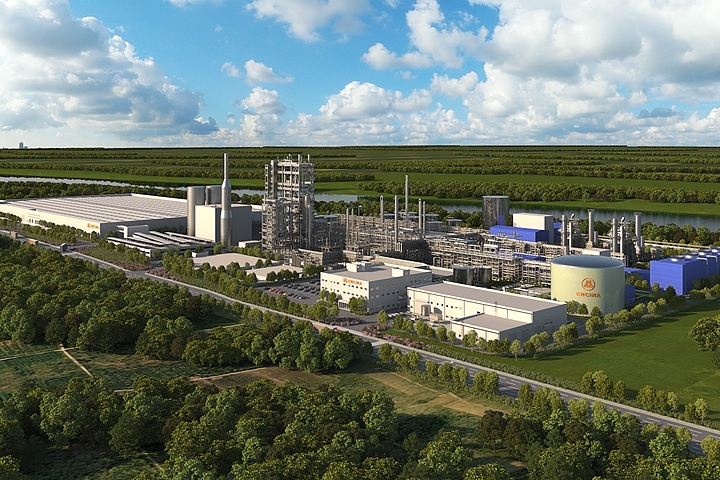ENCINA
Recycler puts first large-scale plant on hold / Growing opposition to chemical plants in the US
The increasing mistrust in parts of the American public towards chemical production and everything associated with it – backed by the stance taken by the current government – has apparently prompted the Encina Development Group (The Woodlands, Texas; www.encina.com) to drop its plans for the construction of a recycling plant in the state of Pennsylvania.
 A rendering of what the now-canceled recycling plant in Pennsylvania might have looked like (Image: Encina) |
In 2022, Encina CEO David Roesser had announced plans to build a USD 1.1 bn (EUR 1.03 bn) plant for the chemical recycling of plastics waste in Point Township by the end of 2024. The plant was meant to process 450,000 t/y of plastics waste from household collections. These are currently stored in landfills or incinerated.
A few days ago, however, Roesser declared that the plans for Pennsylvania would not be pursued any further for the time being. Instead, the focus would shift to developing projects in important global markets such as Saudi Arabia and Southeast Asia – as well as other locations in the US. According to Roesser, one of the reasons for the decision against Point Township was that Encina’s customers would require larger volumes of chemically recycled primary products in future, which is why the plant design now had to be recalculated. A company spokesperson confirmed to Plasteurope.com that the plant design now provides for a 20% larger capacity than before, i.e. 540,000 t/y.
Nevertheless, the decisive reason for turning away is more likely to be the fear of growing resistance from the population around Point Township, which is located on the Susquehanna River, to the north of the state capital Harrisburg. Local environmentalists are arguing that the company’s recycling process is yet untested and that it would depend on taking large quantities of drinking water from the river. Above all, they warn against transporting the resulting chemicals by rail.
A lawyer for the Clean Air Council (www.cleanair.org) – one of the oldest environmental organisations in Pennsylvania’s largest city Philadelphia – referred to the devastating rail accident in East Palestine, Ohio, last year, when several chemical wagons exploded. “Every community along the railway line here would be in danger of experiencing the same thing,” Eleanor Breslin is quoted as saying in US media.
Using a proprietary catalysis process, Encina produces a so-called BTX/P fraction, i.e. aromatics such as benzene, toluene, xylene, and propylene. These are to be used as feedstock materials by plastics producers to produce new polymers after having been tested and ISCC+ certified by the American Society for Testing and Materials (ASTM). According to the latest information, Encina is currently only operating a pilot or demonstration plant in Texas. Point Township should have been the first industrial-scale plant.
Meanwhile, US resin producer Eastman (Kingsport, Tennessee; www.eastman.com) recently announced plans to build a second molecular recycling facility at its Longview, Texas, site after the company was selected by the US Department of Energy for investment.
25.04.2024 Plasteurope.com [255146-0]
Published on 25.04.2024

 German version of this article...
German version of this article...